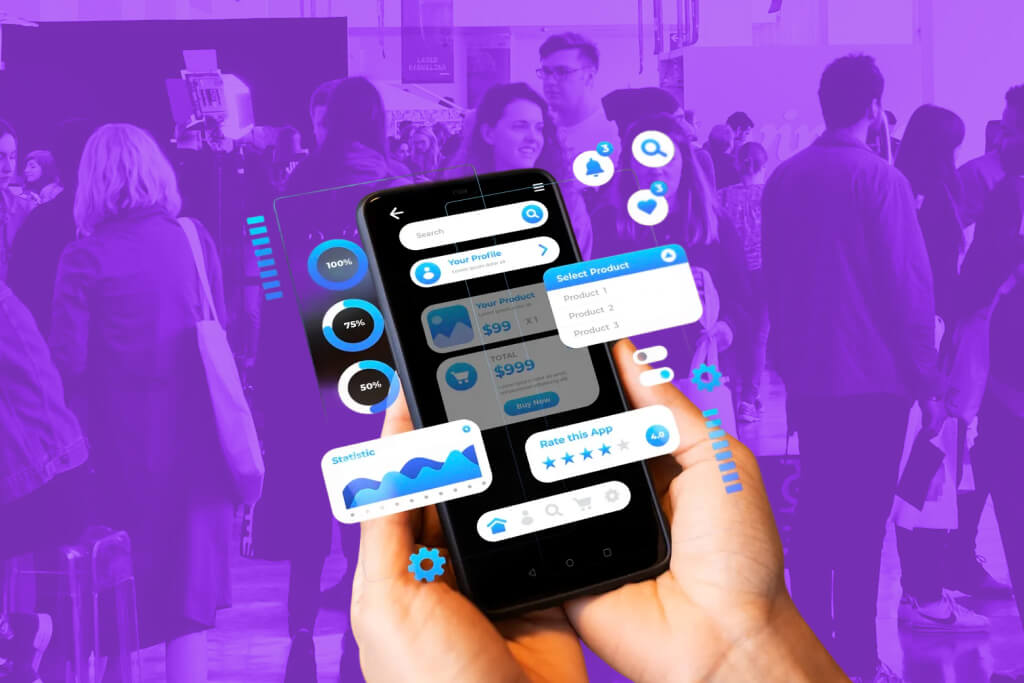Remember 2020? A time when an unprecedented event had us, as a species, stuck indoors. Yet we continued to work and thrive - mostly thanks to an innate need to well… be 'social'. Humans after all are social beings who seek community and a sense of belonging.

So all traditional systems of entertainment, work, and socializing went digital. We adapted and adopted. This occurred even in the realm of more traditional forms of networking - namely events. Professionals across the globe congregated on screens and interacted with colleagues from across the world.
While this displays our resilience as a species, it also speaks volumes about a marketing system that has stood the test of time - events. Despite lockdown constraints, different types of events - professional and recreational continued to be organized.
.jpeg)
Withstanding a pandemic is no easy feat, but an entire industry managed to do just that. Today the events industry continues to thrive and is projected to grow to $1,552.9 billion by 2028.
While naysayers may disagree and assume that digital marketing is the future of brand marketing, surveys cite that 54% of event organizers conduct different types of events to spread brand awareness. This reliability is also made possible because of adaptability. Big events, business events, and various other types of events can now seamlessly be hosted via virtual, in-person, or hybrid methods.
As an event organizer and event marketer it’s imperative to understand the types of business events that can help elevate a brand’s visibility and client base.
What Are The Events I Can Organize? An Overview For Event Organizers and Event Marketers
In-Person Events
In-person events are a traditional way of hosting events. These events are held in physical spaces and are often classified as big events because of their sheer scale.
For attendees, such events are a great way to build and expand professional networks. In addition, such events help attendees and participants gain knowledge and share ideas with peers.
.jpeg)
For event organizers and event marketers, such events are a great way to draw awareness to their brand. It also opens the gateways to sponsorship opportunities, improves ticket sales, and offers a great platform to showcase the brand and its messaging. Brands can also associate with different campaigns that speak of tech innovations, medical breakthroughs, academic achievements, and more.
Despite virtual and hybrid events gaining popularity, in-person events are here to stay. 72% of event oragnizers believe that in-person events continue to play a pivotal role in their overall marketing strategy. They use in-person event platforms to successfully organize such events.
1) Conferences
These are often 'big events' that bring together experts, panelists, and stakeholders from a specific industry. Conferences are often characterized by the sheer volume of guests in attendance - this number can well cross a hundred or thousand attendees.
.jpeg)
Conferences are often held over the span of a day or a couple of days depending on the topic being discussed. Contrary to traditional beliefs, conferences aren't just limited to 'speaking' sessions but have transformed into proactive and engaging events. Contests, exhibitions, and opportunities to network are all part of conferences today.
Hosting a conference is a great way for brands to place themselves as industry experts and it is easy manage with mobile conference app. In addition, word-of-mouth marketing often thrives in such settings since attendees will often discuss their takeaway with others in their professional network.
Explore our Event App for unforgettable experiences.
2) Trade Expos
Trade shows or exhibitions are business events where brands, manufacturers, and stakeholders from a specific industry, eg; automotive, come together to exhibit their products and services. Workshops, demo sessions, and presentations are an integral part of expos. Find best trade show app here.
.jpeg)
Trade expos hold immense allure for exhibitors and participants since they offer a great opportunity to network with potential customers, build a robust client database and showcase their products. This effort does yield results since 92% of attendees at trade shows come to see what's new in products and services.
3) Seminars
These are either standalone event types or are organized together with conferences. At the core of seminars are presentations that instruct or educate. Such type of corporate events are more centered on learning. For attendees, seminars don't just offer new ideas about their fields but also offer a way to add certification and credence to one's portfolio. Seminars held for students, medical professionals, scientists, academicians, and tech professionals are all a great way to learn and network.
.jpeg)
For organizers, a standalone seminar is a great way to prepare for a larger conference or big event. It gives you an understanding of the logistics involved, managing talent and experts without worrying about the scale of operations.
4) Workshops
Interactive, engaging, and fun - are ways in which one could describe workshops. Often different types of events offer attendees a passive experience. While such events are great for acquiring knowledge and networking, workshops are organized for a different pupose.
Attendees of workshops often sign up for the practical experience. For instance if guests are attending a workshop on 'Public Speaking For Corporates' then you will not only will they listen to experts but also be given excercises to practice what is taught. This is a great way of immediately implementing ideas and leads to higher retention of information.
Workshops can also be held with a hybrid model but in-person workshops offer a community experience which is great for practical learning.
5) Field Marketing Events
These are the 'X-Factor' of promotional events. Digital marketing and even aggressive offline marketing often lack a personal touch. Field Marketing is the bridge that offers customized experiences to new customers and existing clients.
Brands often host product launches, in-store events, in-store giveaways, product promotions, and demonstrations under Field Marketing Events. Often such type of corporate events help brands successfully display their expertise, establish strong connections with new customers, and raise brand awareness. While Field Marketing Events can be conducted by most industries and brands, they offer great turnout for consumer-facing industries.
Field Marketing Events offer a great platform to introduce and engage consumers about brands and more so, the people who are responsible for creating magic.
Virtual Events
Prior to COVID, virtual events were infrequent but have now gained popularity. It's estimated that the virtual event market will reach an estimated $366.5 billion by 2027. Despite the lift on lockdown measures, professionals prefer attending virtual sessions for certain events.
This is because attendees and participants can easily log in based on their schedules or from the comfort of their homes. This saves time, money, and resource without comprising on the experience.
.jpeg)
For organizers, virtual event platform have proved to be a boon. Such events allow organizers to invite more people from across the globe, save on rent and infrastructure costs, and offer more specialized engagement to attendees.
Let's cover a few events that have seamlessly transitioned to a digital environment.
1) Virtual Summits
These summits are usually high-stakes business events since they involve the attendance and participation of industry leaders and board members.
The demand for virtual conferences has skyrocketed due to their stellar outcomes. With powerful online tools for engagement, organizers have been able to reach a wider audience and invite keynote speakers from across the globe. This helps save costs and fulfill brand objectives more effectively.
2) Training Sessions
Virtual training sessions allow mega organizations to involve more members of their teams from across the globe. Such big events allow teams from different departments and zones to interact with each other. While travel may not always be feasible, such virtual sessions allow members to experience camaraderie and learn from peers even in a remote setup.
.jpeg)
These types of events include workshops, training for new personnel, debriefing sessions, and more. The focus for attendees is to acquire an in-depth understanding of the brand.
New team members can especially benefit from such sessions and gain insights from experienced teammates who may work remotely.
3) Webinars
Webinars are one of the most popular virtual events with 95% of marketers citing these types of events as integral to their marketing efforts. Lead generation, training, and even product launches are done via webinars. In addition, Increased brand awareness, facilitating partnerships, and establishing thought leadership are some of the many perks offered by webinars.
For attendees and organizers both, webinars can offer a great platform to network with a wider pool of professionals.
4) Recruiting Events
Brands are formed by the resources they hire! This is true for all brands functioning across industries. Top talent, as most hiring managers know, is hard to come by. Recruiting Events are aimed at solving the problem of acquiring talent that adds value to the brand and aids its growth. Such events, prior to COVID-19, were held in-person. This limited the talent pool to those candidates who lived locally. Post Covid, recruiting events are held virtually and often witness a large turnout.
These event examples offer a win-win situation of both employers and employees. It allows employers to create a positive and inclusive brand image and allows employees to meet and interact with prospective brands. This symbiotic and mutually-beneficial relationship is great for the long-term careers of talented resources. Brands often use recruiting events to also familiarize recruits with best industry practices. In addition, toolkits and resources are offered to new talent to help them hone their professional skills.
5) Private Events
Investor meet-ups, board meetings, advisory meetings and more such events are classified under Private Events. These are often intimate events with a smaller attendee list and often include the top management of organizations.
Private Events are known for their confidentiality. While such business events can be held in person, larger organizations with a global workforce have migrated these types of events to virtual platforms. Considering their confidentiality, it's integral to host a private event with 100% digital security and 0 data breaches.
To ensure safety, brands adopt platforms like Eventify to organize gated events with single sign-up options. This ensures no digital gatecrashes or security breaches.
Hybrid Events
Events that are simultaneously held in-person and virtually are known as hybrid events. Such events create sweet spots for attendees and organizers alike. They offer an extra layer of flexibility by allowing people to attend from anywhere in the world and at any time. Here's our list of event examples that fit like a glove into the hybrid event style.
1) Town Halls
Companies often organize town halls to discuss impactful changes, and share updates about developments. Discussions surrounding workflow improvements, nurturing professional relationships, and even recognizing the work of employees is done via these business events.
Many companies, today, are conducting town halls in a hybrid setup - since it helps engage employees from across countries and branches. This also allows companies to archive events for future reference. The hybrid setup also works well in scenarios where pressing updates need to be shared with the entire organization, on a priority basis.
2) Trade Shows and Expos
There was a time when it was unfathomable to host trade shows online. A traditional event type is now thriving in a hybrid setup. In 2021 alone, 30% of trade shows were held as hybrid events.
This is a great way for brands to reach wider audiences from anywhere in the world. Technology such as Eventify has also helped create virtual maps, digital registration systems, virtual survey kiosks, digital conferences, and more to enable hybrid events to function seamlessly. Discover how to simplify event management with event registration software.
3) Product Launches
.jpeg)
Brands are leveraging virtual platforms to showcase new products and innovations. Such types of events are now accessible by industry players, stakeholders, and in some cases, the general public - all thanks to a hybrid setup. With the aid of digital reach, brands are successfully making product launches more inclusive, interesting, and engaging experiences.
4) Sales Kickoffs
These are internal company events held at the start of a new financial year. These types of events include an overview of sales achievements, revenue growth and plan for the new quarters. Sales teams, marketing heads, stakeholders and board members are often included in the attendee line-up for Sales Kickoffs.
The hybrid format is preferred for such types of events since it allows for teams from different time zones and branches to participate. So while the team at headquarters attends the live event, the team at branch offices attends the event virtually.
Sales Kickoffs are a great medium to encourage team members towards achieving company goals. It successfully fosters a sense of partnership and solidarity in all members who belong to the brand.
5) Multi-Department and Multi-Site Meetings
Townhalls, awards and recognitions, team updates and key news is shared during Multi-Department and Multi-Site Meetings. These types of events are a great way to get the entire organization abreast on tech developments, sales growth, and to help team members from across offices to communicate and network.
The hybird format works seamlessly for multi-site meetings since it requires minimal tech investment - all you need is a stable internet connection and a projector. In addition, these events help save on travel and accomodation expenses without compromising on the business event experience.
5-Minute Guide to Organizing Successful Key Events.
As an event organizer, it's imperative to understand how best to organize and host a successful business event. After all, an event that is effortlessly executed helps you gain more clients and projects your business as a reliable partner. To better equip yourself with the challenges of hosting different types of events, be sure to follow this quick guide.
1. Understand Budget
It's key to have clarity about the budget you are allotted. If you are commissioned by a brand then work with their marketing team to understand their budget before making a strategy. This will give you a threshold according to which you can strategize and plan the key aspects of conducting the event.
2. Understand Target Audience
Business events are only as successful as the footfalls and engagement they receive. The perfectly orchestrated event may lead to minimal interest if the target audience is not defined. To avoid this, always begin by understanding the target audience's demographics, interest areas, and more.
3. Choose An Event Type
As we have discussed there are multiple ways of organizing types of corporate events. Begin by understanding which platform is best suited for the event. Your budget and target audience will further help you make this decision.
4.Identify Event Goal
Even events that have free entry passes are held keeping in mind a clear goal. This goal can vary based on brands and industries. For instance, brand A's goal may be lead generation and database expansion. While brand B might be seeking to spread awareness about a product. Identifying event goals will help you further identify what organizing strategy will work best for the different types of events.
Eventify - An Indispensable Tool for Organizing Different Types of Events
Now that you have a good understanding of the type of events you can organize and quick tips on how to best organize them - you are all set. Except post planning comes execution and irrespective of the type of event you host, organizing one is no easy feat!
Even if you have ample manpower and resource, you still need a tool to help streamline all the fragment pieces. Eventify offers just that with a robust and intuitive interface that supports virtual, hybrid, and in-person event requirements. You can even customize the app to best represent your brand or your client's brand.
With availability to host trade shows, conferences, seminars, webinars, and more you can leverage Eventify's application to create a seamless and hassle-free event experience.
Contact our team today for a quick demo and explore the end-to-end top event management software solutions.
Frequently Asked Questions
What Are The 4 Types of Events?
While there are many different types of events held annually across the globe, the most common 4 types of events are:
1) Webinars - Considered to be the most popular medium of sharing knowledge and expertise, webinars gained immense popularity during the pandemic and have continued to deliver results.
2) Conferences - Almost all industries and fields conduct conferences for industry members and peers. Conferences, both in-person and hybrid, are a great way to network, expand one's knowledge and learn about innovations in the industry. These large-scale events are a great source of information for participants.
3) Trade Expos/Shows - Trade shows are events held at grounds, stadiums, or convention centers where manufacturers, producers, and stakeholders can showcase their products and innovations to attendees. Trade shows offer a win-win experience to show organizers, participants, as well as audiences since all of them, draw value from the event.
4) Product launches - Recently, product launches have gained a lot of popularity amongst industry insiders as well as the general consumer. Large-scale tech brands often host in-person or hybrid events to showcase their latest offerings. These events are broadcasted across the globe to generate interest in the product which invariably aids in product sales.
How Many Types of Events Are There?
There are many types of events from conferences, trade shows and expos, seminars, product launch event, town halls, team offsites, virtual summits, seminars, conventions, exhibitions, and more. These and many more are events that are conducted to educate and inform audiences about products or industries. Each event has its own benefits and characteristics which help organizers decide on which best suits their needs.
What Are The 3 Classification of Event Types?
The 3 classifications of event types are virtual, in-person, and hybrid. In-person has been a traditional and conventional way of hosting events where a large group of people comes together. Whereas virtual is an event type that gained traction during the pandemic and has continued to remain popular. Virtual events are held and attended remotely with the aid of event technology. Hybrid event types are a combination of the above 2. In such types of events, attendees have the option to partake in the event virtually or in person.
Each of these event types is a great option for event organizers and marketers to reach wider audiences and spread awareness of their brand.
What Are The Types and Classifications of Events?
While events are classified as virtual, hybrid, or in-person, their types vary greatly. There is a multitude of event options that can be organized based on each brand’s unique requirements. For instance, as an organizer working in the automotive industry, conducting an expo might offer great returns to brands associated with you. So the type of event you choose and how you choose to organize it depend on your target audience and event goal.
Data Source
1. https://truelist.co/blog/event-industry-statistics/
2.https://truelist.co/blog/event-industry-statistics/
3. https://www.bizzabo.com/blog/state-of-in-person-events-infographic
4. https://www.thetradeshownetwork.com/trade-show-blog/20-powerful-stats-on-the-value-of-trade-shows-and-expos
5. https://influencermarketinghub.com/virtual-event-statistics/
6. https://truelist.co/blog/virtual-events-statistics/










.png)



.jpg)


